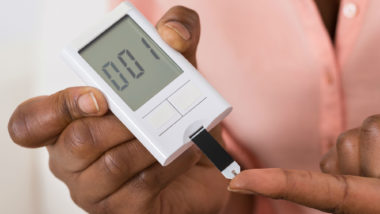
Studies of the type-2 diabetes drug Invokamet have revealed evidence of serious side effects, including an increased risk of amputation.
Along with exercise and diet modifications, canagliflozin is a prescription medication frequently recommended to help lower blood sugar in patients with type-2 diabetes. This class of medication is referred to as SGLT2 inhibitors. The drugs in this class work by assisting the kidneys in removing sugar from body through the urine.
When Invokana is combined with the diabetes medication metformin, it is referred to as Invokamet. When it is used as a single drug, it is known as Invokana.
What Are the Most Common Side Effects of Invokana or Invokamet?
Fatigue, yeast infections, increased urination, urinary tract infections, weakness, skin sensitivity to sunlight, constipation, kidney problems and bone fractures are among the most commonly reported side effects by users of these medications, WebMD reports.
Are Side Effects of Invokana Serious?
Invokamet and Invokana’s side effects may be serious or even life-threatening depending on when they are identified and the level of severity.
Two large clinical trials found an increased risk of leg and foot amputations among patients taking the medications. These studies were called the CANVAS and CANVAS-R studies.
In total, both studies reviewed the outcomes of 10,142 study participants. 187 patients, or 1.8 percent, had one or more amputation event. Because some patients had more than one amputation, a total of 290 amputation events were recorded in studied patients.
The CANVAS trial showed that 5.9 out of every 1,000 patients had an amputation if treated with canagliflozin. In the placebo group, only 2.8 out of every 1,000 patients needed an amputation. The CANVAS-R trial has similar results with 7.5 out of every 1,000 canagliflozin patients needing an amputation and only 4.2 out of every 1,000 placebo patients undergoing an amputation.
While many of the side effects associated with these drugs may not be as serious as amputation, patients taking either Invokamet or Invokana should be aware of the risks for developing problematic symptoms.
Does Dosage Have Any Impact on The Use of These Drugs?
Many patients begin at a starting dose of Invokamet. Those who are able to tolerate the medication at this lower dosage may increase the dosage applied to them, according to rxlist.com.
What Are the Amputation Risks?
The U.S. Food and Drug Administration (FDA) has identified an increased risk of foot and leg amputations with the use of diabetes medication known as canagliflozin, sold under the brand name Invokana. In 2017, the federal agency required information about the amputation risk be applied to canagliflozin drug labels.
The FDA has also advised health care professionals about side effects that may put a patient at risk of amputation. Patients reporting any adverse events should be taken seriously and the health care provider should consider prescribing other medication, according to the FDA.
How Can Consumers Avoid Amputation?
Amputation is a serious risk of diabetes, regardless of the treatment option. Thousands of adults have diabetic lower limb amputations every year. The risk can be tied to the increased risk of diabetic foot ulcers.
In patients with diabetes, circulation is diminished which can result in poor wound healing. If a diabetic person gets a cut on their foot, they are at a higher risk of developing a larger sore or ulcer. If these ulcers do not heal, an infection can occur. This can lead to gangrene and the need to amputate.
Medical News Today says that preventing diabetic foot ulcers and subsequent amputations relies on managing blood sugar levels, practicing regular foot care, and managing other risk factors.
Foot care includes monitoring the feet for injuries, stimulating blood flow, wearing dry socks, washing feet daily, ensuring sensation in feet, trimming toenails, and scheduling regular foot examinations with a doctor.
However, even if a patient does all of these things, they still may be at risk for amputation if they take Invokana or Invokamet. If you or someone you know has been seriously hurt as a result of taking Invokana or Invokamet, a defective drugs lawyer can provide advice on possible next steps.
Contact an experienced Invokana attorney today to discuss your legal options if you or a loved one had to undergo a lower limb amputation after taking Invokana, Invokamet or Invokamet XR, including a toe amputation, foot amputation, knee amputation or leg amputation. Fill out the form on this page to obtain a FREE case evaluation with an Invokana amputation attorney.
ATTORNEY ADVERTISING
Top Class Actions is a Proud Member of the American Bar Association
LEGAL INFORMATION IS NOT LEGAL ADVICE
Top Class Actions Legal Statement
©2008 – 2025 Top Class Actions® LLC
Various Trademarks held by their respective owners
This website is not intended for viewing or usage by European Union citizens.
Get Help – It’s Free
Join a Free Invokana Class Action Lawsuit Investigation
If you qualify, an attorney will contact you to discuss the details of your potential case at no charge to you.
Please Note: If you want to participate in this investigation, it is imperative that you reply to the law firm if they call or email you. Failing to do so may result in you not getting signed up as a client or getting you dropped as a client.
E-mail any problems with this form to:
[email protected].
Oops! We could not locate your form.












